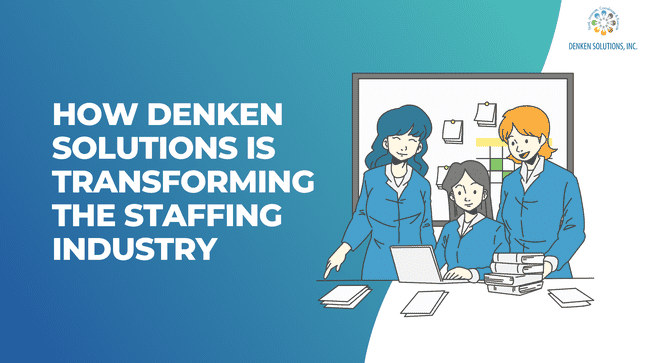A recent article published by Staffing Industry Analysts (SIA) suggests that about 65% of leading companies across the globe have an intent to enhance the engagement of a contingent workforce over the upcoming two years. It further suggests that about 80% of global firms are using contingent workers to meet their skill-specific business or project requirements at reduced costs. This rise in the widespread use of contingent workforce is also noticed in high-tech companies. Considering this trend momentum alongside the rapid advancements in the technology industry, it can be stated that contingent workers, including freelancers and contractual workers, are on the way to becoming central components of the modernized workforce.
According to a previous blog published by Denken Solutions, as businesses strategized to navigate through unforeseen job markets amidst the COVID-19 pandemic-related restrictions, there has been a major shift in worker preferences, leading to a rise in flexible workforce solutions. Just like remote work norms and hybrid work models, hiring contingent workers is now a new and evolving trend in the tech industry.
In this article, let’s discuss how this contingent workforce trend proves to be a powerful incentive for high-tech employers.
Top reasons why contingent staffing for high-tech companies is beneficial
- Harnessing a diverse and versatile group of talent
Diverse and versatile skill sets often remain in demand in high-tech companies, especially to support new software development or any other technological innovation. However, when specialized skills and capabilities are required just for a product rollout or a time-bound project, it is unfeasible for tech employers to invest on full-time staff, from the finance management point of view. During such situations, employers rely on the contingent workforce comprising of talented professionals with niche expertise who can be efficiently hired to meet the project or business needs.
- Elevating productivity and boosting employee morale through remote work capabilities
The unforeseen disruption in the business environment caused by the pandemic enabled employers as well as employees to explore remote work capabilities. Implementing remote work norms for new hires as well as existing employees became a strategic imperative for all businesses, including high-tech companies.
Today, even though the pandemic situation is somewhat brought under control, many tech companies continue to appreciate the advantages they get by following remote work norms. By opting for remote contingent workers, tech employers not only get connected with specialized professionals but they also boost employee morale due to better work-life balance. This in turn helps them enhance their productivity levels, thus improving their employee retention rate.
- Cutting off overhead costs related to full-time employment
A survey published by Gartner in 2020 demonstrated that 32% of businesses operating in various industries were replacing their traditional, full-time employment model with a contingent workforce with the primary goal of cutting off costs. This is indeed one of the obvious benefits that tech employers get by hiring contingent workers, particularly for short-term business requirements or project-based needs.
By deploying a contingent workforce instead of engaging a full-time workforce for a pre-determined timeline, employers save themselves from offering fixed salaries and benefits. Besides that, proficient contingent workers do not require in-depth training and mentorship, thereby relieving employers from investing in these areas.
- Developing a flexible and agile team that can be scaled when needed
As mentioned before, a skilled and competent contingent workforce is the best option for tech employers when it comes to project-specific needs. In addition to saving costs, contingent workforce gives them the opportunity to scale their business activities based on internal needs or external market conditions. This is because with contingent workers, employers are free from long-term commitments.
For instance, when the project goals are achieved or during economic downturns, employers can release contingent workers based on their employment terms and conditions. Similarly, they can again hire and engage the contingent workforce when the situation calls for. This helps high-tech companies to attain flexibility and agility while operating in the highly vulnerable and competitive business environment.
- Achieving a time-efficient hiring process
Another benefit of contingent staffing for high-tech companies is that it helps in reducing the overall time involved in the hiring process. This is particularly true for tech employers who collaborate with an expert staffing firm and transfer all the hiring tasks and responsibilities on the latter. With an extensive database of experienced contingent workers, it becomes easier for staffing agencies to find out the relevant candidate who might suit the business or project need of a tech employer. Hence, from screening to onboarding, when all tasks are tackled by the staffing agency, the tech company can divert its focus on prime operational areas, saving a good deal of time.
Read also: How Contingent Staffing Agencies Match Candidates to Companies?
Conclusion
A large number of high-tech companies find it feasible to deploy a contingent workforce, especially during time-bound projects, software development, or product rollout. Contingent workers not only enable tech businesses to harness a wide range of diverse talents for strategic innovation but they also help in cutting off huge amount of costs and time. With a contingent workforce, employers can efficiently and effectively scale their operations and remain flexible and agile in all business circumstances. Besides that, by hiring contingent workers across the globe, tech employers back remote work policies that help in boosting employee morale, thereby elevating the productivity levels.
Want to deploy a contingent workforce to drive your tech business forward? Then, let’s join our forces!



